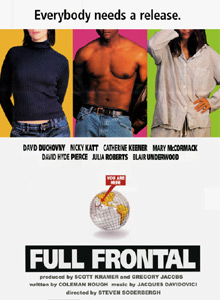
Regarding FULL FRONTAL :
…Steven Soderbergh chose Jacques Davidovici, a French composer who has already written the music for 35 films and who signs here his first score for a U.S. film. We still have in mind the elegant (and highly efficient) use of the music in « TRAFFIC ». With FULL FRONTAL, Soderbergh shows one more time his taste for an "ecological" use of music in a film. Elegance, efficiency, sobriety seem to be the key words of his musical choices. So many adjectives that could be used to define Jacques Davidovici's music which –despite a rather reduced timing- manages to bring a sensibility and a point of view that definitely contribute to the balance of the film…
CINEMUSIC
…"Full Frontal" and "Day for Night" Are Hardly Night From Day Not only are both Soderbergh's and Truffaut's comic films about moviemaking, but Roberts wears an identical shag wig to the one worn by Jacqueline Bisset. And both actresses play actresses who throw diva hissy fits over craft services. Bisset's character demands real country butter, while Roberts' fusses over the celery in her tuna salad sandwich. Plus we couldn't help but notice that Jacques Davidovici's lush classical interludes are tres reminiscent of Georges Delerue's score in the 1973 film…
LOS ANGELES TIME
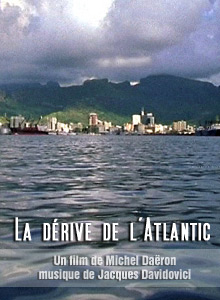
Regarding LA DERIVE DE L'ATLANTIC :
...A brilliant music score signed by Jacques Davidovici...
LE FIGARO
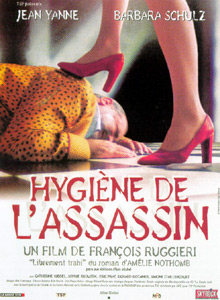
Regarding HYGIENE DE L'ASSASSIN :
...The good idea was to entrust Jacques Davidovici (Neuf Mois, Blues Trottoir… ) with the music score. HYGIENE DE L'ASSASSIN, the score, is a perfect illustration of what electronic music can add to a feature film, thanks to its cinematic quality and its inner ability to create an atmosphere. Though Jacques Davidovici's music was created as a complement to animated footage, it can nevertheless be listened to on its own, as a variation on a heavy theme, half way between Ambient and Trip Hop...
TRACKS
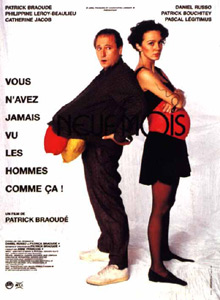
Regarding NEUF-MOIS :
…One of the most exciting elements of the film is its jazzy-klezmer musical score…
VARIETY
…Still it won't let you forget the perky tziganeries signed by Jacques Davidovici and which made Patrick Braoudé's film swing…
PREMIÈRE
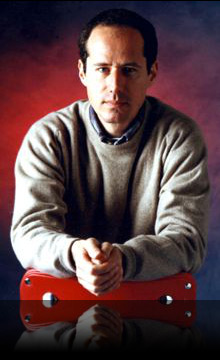
JACQUES DAVIDOVICI : Regarding… music for comedy
…Composing the score for a comedy is always a tricky exercice. You need to be dynamic without being bouncy, light yet not insubstantial, moving but not melodramatic. Trying to express through music the complexity of contradictory feelings and changing situations, just like in real life. If by any chance you manage to come up with the right dosage of all these ingredients, then it's a bit like in cooking, you will get something that is not only the juxtaposition of its elements, but something else, something that has a life of its own. A music that will remind the audience of the emotions they have felt with the characters, but which can also allow the ones who haven't seen the movie to imagine their own story…
LE TECHNICIEN DU FILM
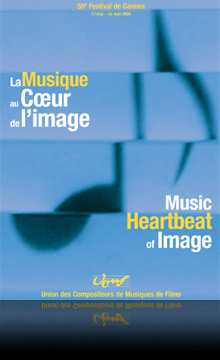
Jacques Davidovici : THE INSTINCT OF THE PICTURE
When we watch a film, three kinds of information assail us simultaneously. Primarily of course, the image (at the speed of light!) which is printed on our retina and travels to the brain to be analyzed. Once that image has been decoded the spectator can react emotionally, but only after the brain has "understood" it. Then comes the dialogue, which also addresses principally our mental skills. Even the sound effects, which give a sense of reality to what we can see or guess. More work for the brain.
And then there is the music. Music doesn't address our intelligence; it doesn't need to be understood. Music goes directly to our 'primitive' brain, the part that deals with instincts and emotions. The part that doesn't think, but rather senses or feels. The fact that music doesn't call for reason allows it (and here is the catch) to deliver a completely independent message, at the same time, however, as the message delivered by the images and that of the dialogue. That is cinema: To listen to three languages simultaneously and understand everything at once. Film music is a language full of sense but not seeking to convince us. Autonomous yet entwined with the image.
Music is the intuition of the film and because it speaks to our hearts and not our minds, it is the element of the film that remains the longest in our memory. It is music that prolongs the life of the film for us. If the silence after Mozart is still Mozart, then one can say that the film music, after the film, is still cinema.
LA MUSIQUE AU COEUR DE L'IMAGE